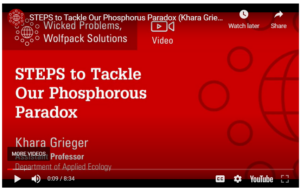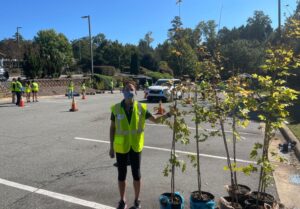Overview

Background
Interdisciplinary risk sciences focuses on developing and translating best practices for risk assessment, risk management, governance, and engaging stakeholders in managing environmental health risks. Key focal areas include environmental risk analyses of emerging technologies in food and agriculture sectors, and other emerging risks, that have high degrees of complexities and uncertainties and require interdisciplinary risk approaches. Extension-related activities focus on translating and communicating best practices for risk assessments and risk governance to diverse stakeholders.
Vision for Extension
As a faculty member with an Extension role, my vision is to develop adaptive, science-based approaches to understanding and responding to emerging environmental health challenges, connecting with key stakeholders, and transferring knowledge.
Understanding Stakeholder Needs in NC. In 2022, colleagues and I conducted a Needs Assessment of NC State Cooperative Extension Agents in all of North Carolina’s counties. The Needs Assessment aimed to better understand Extension agents’ needs and priorities within diverse topics of environmental health and risks, based on the perceptions and views of Extension agents’ regarding environmental health and risks relevant to NC as well as within the community(ies) they serve. A summary and key findings from the Needs Assessment Extension report is available here. This work is published in Environment Systems and Decisions, here.


Based on these findings, a range of Extension programs have been developed to respond to Extension needs in North Carolina, including those related to:
- Best practices for engaging stakeholders
- Identifying key concepts of risk science, including identifying, managing, and communicating risks
- Understanding and addressing PFAS in our communities
- Understanding key concepts of the use of genetic engineering in food, agriculture, and the environment
- Engaging and communicating with stakeholders to improve phosphorus sustainability
Extension Publications
- Grieger, K., May, K. 2024. Guide to Understanding and Addressing PFAS in our Communities. NC State Extension Publication. https://content.ces.ncsu.edu/Guide-to-Understanding-and-Addressing-PFAS-in-our-communities
- Nelson, N.G., Harris, A., Anarde, K., Hino, M., Grieger, K. 2023. Exercise Caution: Tidal Floods May Contain Pollutants. North Carolina Sea Grant. https://ncseagrant.ncsu.edu/exercise-caution-tidal-floods-may-contain-pollutants/
- Grieger, K., Horgan, M., Cummings, C. 2023. Let’s Talk About Risk: A Guide to Identifying, Assessing, Managing, and Communicating Risk. NC State Extension Publication, AG-945, pg. 1-12. https://content.ces.ncsu.edu/lets-talk-about-risk-a-guide-to-identifying-assessing-managing-and-communicating-risk
- Grieger, K., Horgan, M., Merck A. 2022. Let’s Work Together in Addressing Environmental and Societal Issues: Guide to Engaging Stakeholders and Communities. NC State Extension Publication, AG-929, pg. 1-10. https://content.ces.ncsu.edu/lets-work-together-in-addressing-environmental-and-societal-issues-guide-to-engaging-stakeholders#section_heading_16962
- Grieger, K., Cummings, C.L. 2022. Informing Environmental Health and Risk Priorities through Local Outreach and Extension. Environment Systems and Decisions, https://doi.org/10.1007/s10669-022-09864-0
- Grieger, K., Zarate, S., Barnhill-Dilling, S.K., Hunt, S., Jones, D., Kuzma, J. 2022. Fostering Responsible Innovation through Stakeholder Engagement: Case Study of North Carolina Sweetpotato Stakeholders. Sustainability, 14, 2274: https://doi.org/10.3390/su14042274
Extension Trainings, Presentations, and Other Media


- Stakeholder Meeting, Biological Phosphorus Removal at Wastewater Treatment Facilities, October 11-12, 2023
- Extension Agent Training (virtual): Understanding and Addressing PFAS in our Communities, monthly June 2023 to present
- Extension Agent Training (virtual): Guide to Engaging Stakeholders and Community Members, monthly April 2023 to present
- North Carolina Plant Science Initiative (PSI) and Extension Summer Intern showcase, Identifying Environmental Sustainability Needs in Iredell County, July 24, 2023
- Extension Agent Training (in-person): Understanding and Addressing PFAS in our Communities, Cumberland County Center, Fayetteville, NC, June 12, 2023.
- Extension Agent Training: Guide to Engaging Stakeholders and Community Members, monthly April- December, 2023
- Wake County Water Partnership Education and Outreach Subcommittee meeting, Guide to Engaging Stakeholders and Community Members, May 19, 2023.
- NC State, Wicked Problems, WolfPack Solutions. Presented on “STEPS to Tackle Our Phosphorus Paradox,” Fall 2022. Link to video here (available Jan. 2023).
- Society for Risk Analysis, Research Triangle Regional Organization. Presented Webinar on “Engaging Stakeholders within Risk Governance Contexts,” April 26, 2022. (Registration here).
- STEPS Center Emerging Research Showcase, April 13, 2022. (Link here).
- NC State, Workshop on Conducting Responsible Research and Innovation (RRI), Co-lead workshop to train NC State faculty on best practices for conducting RRI in their groups and labs, April 8, 2022.
- NC State Extension Annual Conference: Exploring Extension Needs in Environmental Health and Risk. Poster Presentation, October 25, 2021. (Link to poster here)
- NC State Extension Annual Conference: Engaging sweetpotato stakeholders in North Carolina through Sweet-APPS. Oral Presentation, October 27, 2021. (Link to recorded presentation here– only for NC State faculty, staff, students).
- NC State Extension Sweet Potato Field Day: Poster presentations and stakeholder engagement NC State-funded, Sweet-APPS project, Horticultural Research Station, Clinton, NC. October, 5, 2021.
- Society for Risk Analysis, Research Triangle Regional Organization. Hosted Webinar by Dr. Christie Sayes on “Assessing the Potential for Pulmonary Sensitization After Respirable Environmental Stimuli Exposure,” June 22, 2021. (Recorded presentation here).
- GRC Connects: Convergence of Nanotechnology with Food & Agriculture. Oral Presentation, June 14, 2021. (Recorded presentation here).
- NC State Extension Webinar: Exploring Extension Needs in Environmental Health and Risk. Oral Presentation, May 21, 2021. (Recorded presentation here).
- NSF-Research Coordination Network, EngageINFEWs. Lightning Round Oral Presentation focused on Best Practices in Stakeholder Engagement. March, 2021. (Recorded presentation here).
- US -EU Stakeholders in Nano-Environmental, Health, and Safety Research Communities Workshop: Bridging Insights and Perspectives. Oral Presentation, September 17, 2020. (Recorded presentation here)
- WNCU Podcast, The Unseen World of Food Nanotechnology. Podcast interview, released September 2, 2020. (Recorded podcast here).
- NC State, Society for Risk Analysis, and RTI International Webinar: The Secondary Risk Society, Risk & Decision-Making in the 21st Century. Webinar host, August 14, 2020. (Recorded presentation here).
- NC State Extension Continuing Education Webinar: Glyphosate: Can we separate fact and fiction? And, how do we control weeds without it? Panelist, July 7, 2020
- NC State, GRIP4PSI, Sweet-APPS Project and Stakeholder Engagement. (Project site here; Photos of stakeholder engagement here).
 Connecting with citizens, Town of Cary tree event.
Connecting with citizens, Town of Cary tree event.
More details
